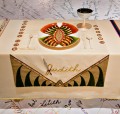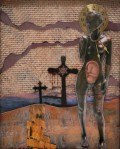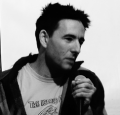Life and Action
Two Takes on Where We're Headed (And by we, we mean Zeek)
Two Zeek board members – one longtime, one new – talk from the heart about the Jewish tomorrow and Zeek.
By Rabbi Rachel Barenblat
I care about Zeek because Zeek is thoughtful, literate, literary. For years, Zeek has been the place to go for meaningful long-form writing which questions assumptions and pushes boundaries. Zeek does work that no one else is doing, and sheds light on conversations that no one else is having – whether that be our 2003 essay on Zionism and Colonialism, or our 2004 essay on Hasidism and homoeroticism, or our 2009 interview with Rabbi Dr. Rachel Adler.
The recent Pew study confirms that one in five Jews today says they are part of “no” religion – which makes us just like the rest of the country, where “nones” (those who check “none of the above” on survey boxes) are on the rise. My question is: how can we open up the richness of Judaism – or the many varieties of Judaism; Judaisms, plural) to those who have opted out of the communal or congregational mainstream as they’ve understood it?
Zeek is a place where that can happen. There’s no barrier to entry here. We’re interested in dialogue and discourse and in creating the Jewish tomorrow which we, ourselves, most need. Zeek is honest, authentic, questioning – qualities which I think a lot of unaffiliated Jews want and need, but may not be finding elsewhere.
By Steven M. Cohen
Small magazines that publish good thought leaders have played a vital role in shaping opinion, in sharpening the skills of the thought leaders, and in forging all sorts of innovative and oppositional movements – in American society, in Jewish life, and, of course, elsewhere.
At a time when organized Jewry has largely succumbed to the influence and interests of the most affluent (people in the financial industry, real estate moguls, and others), Zeek can play a valuable role in vitalizing and sustaining the historic Jewish voice for economic justice. It can advance the discourse by not only bringing a Jewish sensibility to bear upon these societal issues, but by bringing a sharply critical perspective to bear upon organized Jewry and its tendency to comfort the comfortable, and afflict the afflicted.
Zeek is laying the groundwork for a strong, sustainable 2014. We need your help. Please consider making a much-appreciated, tax-deductible donation to Zeek today. Support from readers, allies and partners keeps Zeek online and independent!
Readers, tell us what you think. What are your questions about the Jewish tomorrow? Why do you care about Zeek? What would you like to see in 2014? Tell us!
Moral Money Tips for Newlyweds, Avoiding Activist Burnout: The Leftist Ethicist
The Leftist Ethicist closes out 2013 with advice for a newlywed couple rethinking how they use and view money, and on being a good friend when you’re worried a fellow activist is fighting too hard, facing burnout and a possible breakdown.
#ReCatalyze Zeek -- aka Shameless Self-Promotion and Emphatic Gratitude (aka Co-Dependent Survival Necessities)
As Zeek’s editor and executive director, I wanted to share my gratitude to all the early adopters who’ve helped our#ReCatalyze Zeek campaign take off on Indiegogo. Each time a new crowd-funded donation comes in, I feel encouraged and energized by this showing of support for what we’re trying to do with Zeek and our vision for a strong, sustainable magazine in 2014!
Women Have a Seat at the Table. But Wait. Who's Clearing? (Ahem, Men)
AuthorsThe sad truth is that, even in Jewish communities that stand for egalitarianism on the pulpit and in the pews, gender-equality disappears in the home.
Pumpkin Latkes
The Zeek archive is packed with articles that have as much relevance and urgency today as they did when they were written. Like this one – in fact, it’s even more timely than it was back in 2010, when it originally ran.
An Activist on Occupy, Two Years After Zuccotti Eviction
Two years later, writes Sarah Seltzer, Occupy reminds us that we have to think big, think together, and keep the slogan in our minds, even when it seems far from reality: another world is possible.
Where, When, Who? Workplace Activism & Healthcare Access --THE LEFTIST ETHICIST
I have seen the same primary care doctor for about five years, and she gives me good care. Unfortunately, I just saw her, and she told me — not without a guilty look in her eye — that expenses and regulations were just too much, and she had decided to close up her current shop and open a concierge practice. My blood ran cold: I mean, sure, I could afford it (I make a good living), but what about all the people who can’t? Is my doctor making an unethical decision? Should I stick with her?
The Post-Ultra-Orthodox Death Prophecy
On Friday, September 27, Deb Tambor, a young mother with bright eyes and deep dimples, killed herself. Deb was a member of the same circle of former ultra-Orthodox Jews that I belong to. Her death, at 33, is sending shockwaves through my community, a sharp reminder of the suffering some of us must endure. Deb went through a brutal custody battle because she rejected ultra-Orthodoxy. Her former community banded together to destroy her children’s relationships with her, using legal muscle, bullying, and religiously fueled indoctrination to reduce her contact with her three children to only one supervised visit a month.
Many have already responded eloquently to Deb’s death with an outcry against the abominably corrupt custody processes that so many former ultra-Orthodox Jews are trapped in, something I care about deeply. Today, though, I’m moved to talk about something else, something more personal for me.
My deepest reaction to this tragedy is not as an activist, but as a fellow former ultra-Orthodox Jew, reminded that so many of us, while moving forward in our lives, are pulled back by a siren call of death.
To Help or Empower? Midwife at a Career Crossroads — Leftist Ethicist, September Edition
A white Jewish woman finishing up her certification as a nurse midwife wants to honor her commitment to racial and economic justice. And provide quality care to all women without compromising her commitment. Now what?
Handcuffs to Synagogue: A New Year, A Recommitment to Action
Tonight at Kol Nidre services, I will chant the prayer that absolves me from all oaths taken the previous year. The thing is — just yesterday I took an oath, alongside 119 women on a very hot day in the shadow of the US Capitol building, an oath that I (with the organization I represent, the National Council of Jewish Women) plan to keep. In part, we promised to:
create a House United for fair immigration reform, a House United through my family, my community and my place of work, a House United for justice and equality for all and especially for the women and children who make up three-quarters of all immigrants but whose needs are woefully ignored by our failed system.
And we put our bodies on the line to reinforce our commitment to this promise.
Welcoming the (Abortion-Seeking) Stranger: Reflections for a Season of Renewal
“This is Meredith,” the voice on the phone announced one afternoon in March. “We have someone who needs a place to stay for the night.”
I took a deep breath. It was the first time I’d gotten a call from the Haven Coalition since I’d signed up to volunteer. I ran my fingers through my hair as Meredith told me about Pearl: 25 years old, 20 weeks pregnant. She’d arrived in New York City from Buffalo and just finished the first part of a two-day abortion procedure. She would wait for me at the clinic on the Upper West Side.
The Leftist Ethicist, R-E-S-P-E-C-T (August Advice)
The Leftist Ethicist is an advice column for Zeek readers who envision a more just world and act to create it.
I have a guy friend that I haven’t seen for a few years. We used to be close, but from what I see on Facebook, he is now hardcore Orthodox. When we were in high school, we would hug and even cuddle on a couch. I’m a girl. Normally, when I see a friend I give them a hug or a kiss, but I don’t know what to do when I will see him at an upcoming reunion. I don’t want to treat him differently, but I want to respect him.
In Defense of Indoctrination
Brainwashing vs.Teaching Values? Katie Halper — comic, writer, blogger, unabashed liberal, and more — sets satire aside to share insights gleaned from making “Commie Camp,” her documentary and loving tribute to Camp Kinderland.
Two Young Chicagoans on Why Iftar in the Synagogue Matters
Back in late 2012, anti-Muslim ads were posted in public transit systems in Chicago, New York, and other major US cities. For us since then, building bridges between the Jewish and Muslim communities is a top priority, and we’re proud to stand alongside others committed to a Jewish voice for social justice.
The Leftist Ethicist — July Edition
I believe the criminal justice system is completely broken and racist. I want to make a difference for good as a jury member. Is it ethical to lie about my negative beliefs regarding the police to up my chances of getting selected?
The Leftist Ethicist — June Edition
In her June column, the Leftist Ethicist tackles public displays of affection, queer solidarity, and how to combat Islamophobia: “You’re not horrible,” she says, “but you might not be very compassionate, either.”
The Leftist Ethicist, May Edition
For her May column, the Leftist Ethicist offers sensible solutions for dilemmas dealing with anti-Semitism, race and class and being an ethical employer at home.
The Bitter & the Sweet: Reflections on Motherhood
Finding words for postpartum depression, Rabbi Rachel Barenblat bravely reflects on her difficult adjustment to motherhood, sharing a deeply personal journey and the poetry that helped her navigate this new terrain, ultimately savoring both the bitter and the sweet. This Mother’s Day, she tells struggling new moms: It gets better.
Madness, Mindfulness & Judaism: Meet Sascha Altman DuBrul
The Icarus Project founder talks to an old punk pal, journalist Jennifer Bleyer, “about madness, social justice and his recently sparked Jewish identity on the eve of his cross-country book tour for Maps to the Other Side.”
The Leftist Ethicist
The Leftist Ethicist is an advice column for Zeek readers who envision a more just world and act to create it. With a commitment to justice and progressive Jewish teaching (and a loving nod to the Bintel Brief), the Leftist Ethicist provides a space to raise questions, without judgment, and receive sensible solutions. Zeek presents the first installment here.
As a wedding present, a distant family member bought my wife and I stock in a company whose treatment of workers I strongly disagree with. I thanked the family member politely, but now I don’t know what to do. Should I keep the stock?
![[the current issue of ZEEK]](../../../image/2/100/0/5/uploads/leftistethicistgraphic-52842c6a.png)
- 5000 Pages of Zeek
- Founded in 2001, Zeek was the first Jewish online magazine, and we have over 5000 pages online to prove it, all available free of charge. Read more in the Archive.
















